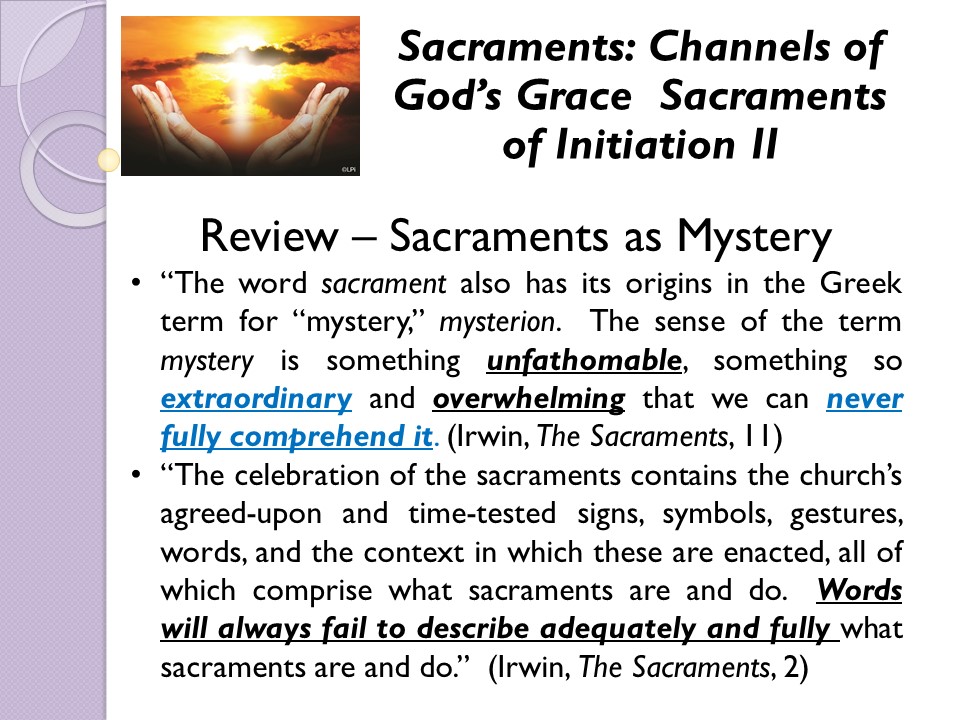Gone are the days when men came to Sunday Mass in suits and women came in their nice dresses. We are offered something wonderful in the Mass (see my series The Greatest Gift: The Eucharist and Uncovering the Treasurers of the Mass). If we understand what God is offering us in the Mass, his Word in the readings, the sacrifice of Jesus in the Eucharist, and the very Body and Blood of Jesus, we should respond accordingly. We should respond with reverence.
Now, reverence does not require suits and nice dresses but our attire at Mass says something. Do people dress in their most casual clothes for Sunday Mass or do they dress like they know the Mass is something special? Daily Mass can be less formal as some people are going to or from work or other commitments requiring a certain dress. The point is to look respectable and show reverence for what we are celebrating.
Of course, I am not sure if people used to wear suits and nice dresses to Mass because of reverence or because that was what was expected. It is what people did. That wasn’t a bad thing but, if you are familiar with my writings and presentations, you know I like to talk about “depth.” For instance, people routinely pray the Rosary but how much do we think about the words. That was the point of my presentation, Praying the Rosary From the Heart.
It is only when we go deeper into what is going on at Mass that we begin to want to be reverent in our attire and in our gestures. From this depth, also comes genuine “active participation” in the Mass. Active participation is not centered on being a lector, altar server, or a musician at Mass. The term “active participation” was used at the Second Vatican Council to signify our engagement at Mass. Parishioners are not just spectators at Mass. Everyone present is to be attentive and engaged at Mass.
So, why has people’s attire at Mass become less formal? Before we rush to blame the Second Vatican Council, let’s look at society in general.
It used to be everyone came to a funeral dressed up. While many still do, it is not uncommon to see people dressed informally at funerals. Society in general has become less formal. There are men who don’t even own a suit. There are women who don’t own formal dresses.
The emphasis now often is comfort. Comfort is important but there must be more.
Casual everyday attire is fine for casual everyday events but not every event is a casual everyday event. I am not looking for everyone to dress formally. I am looking to help people understand that not all events are the same.
For those who do own formal attire, I invite you to ask yourself, when do you were it? What types of events call for formal attire? Does Sunday Mass qualify?
Does God impressed when we wear formal attire to Mass?
1 Samuel 16:7 helps provide the answer, “But the Lord said to Samuel: Do not judge from his appearance or from his lofty stature, because I have rejected him. God does not see as a mortal, who sees the appearance. The Lord looks into the heart.” God is most interested in what is in our hearts, not our appearance.
That being said, our external actions say something about what we think on the inside. When we bow to the altar, we are recognizing the altar as the place where we offer the Sacrifice of Jesus in the Mass. The bow is to signify what we believe in our hearts. When we genuflect to the Eucharist in the Tabernacle, we are acknowledging the belief in our hearts that Jesus is present in the consecrated hosts in the Tabernacle.
Jesus is truly present in the Eucharist but here lies the problem. People don’t understand or believe it is Jesus. Now, we aren’t going to understand how the bread and wine are transubstantiated into the Body and Blood of Jesus. It is beyond us (see Job 38-40) to understand. We don’t have to understand to believe.
Unfortunately, many people do not believe in the Real Presence of Jesus. We have lost our sense of “mystery.”

I believe that two things are essential for proper reverence and active participation at Mass. It is a sense of mystery and a belief in the Real Presence of Jesus. To believe in the Real Presence of Jesus requires a sense of mystery. If the only things that we believe are the things we can touch, see, and explain in earthly terms, then we have lost “mystery.” To belief is to believe in what cannot be proven.
God gives us the gift of reason to use. When “reason” is not enough, God reveals himself to us in faith. In becoming incarnate in the flesh, Jesus becomes the visible face of our invisible Father.
From mystery, from faith, comes reverence. We are not just a soul. We are body and soul. When we believe the mysteries of our faith, the external actions of our body will express the faith we have in our soul.
As to the way you dress at Mass, let your soul determine it.
Peace,
Fr. Jeff
